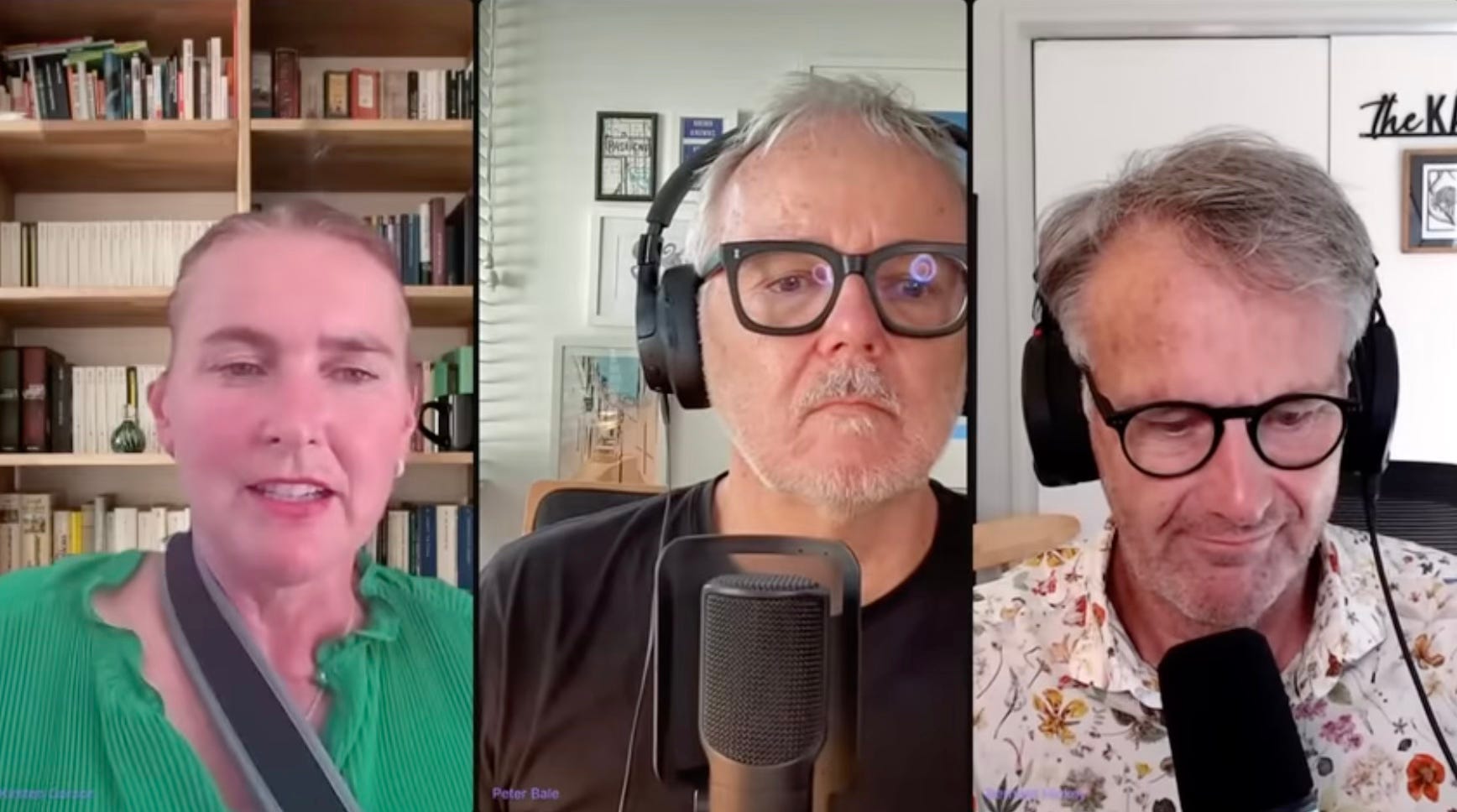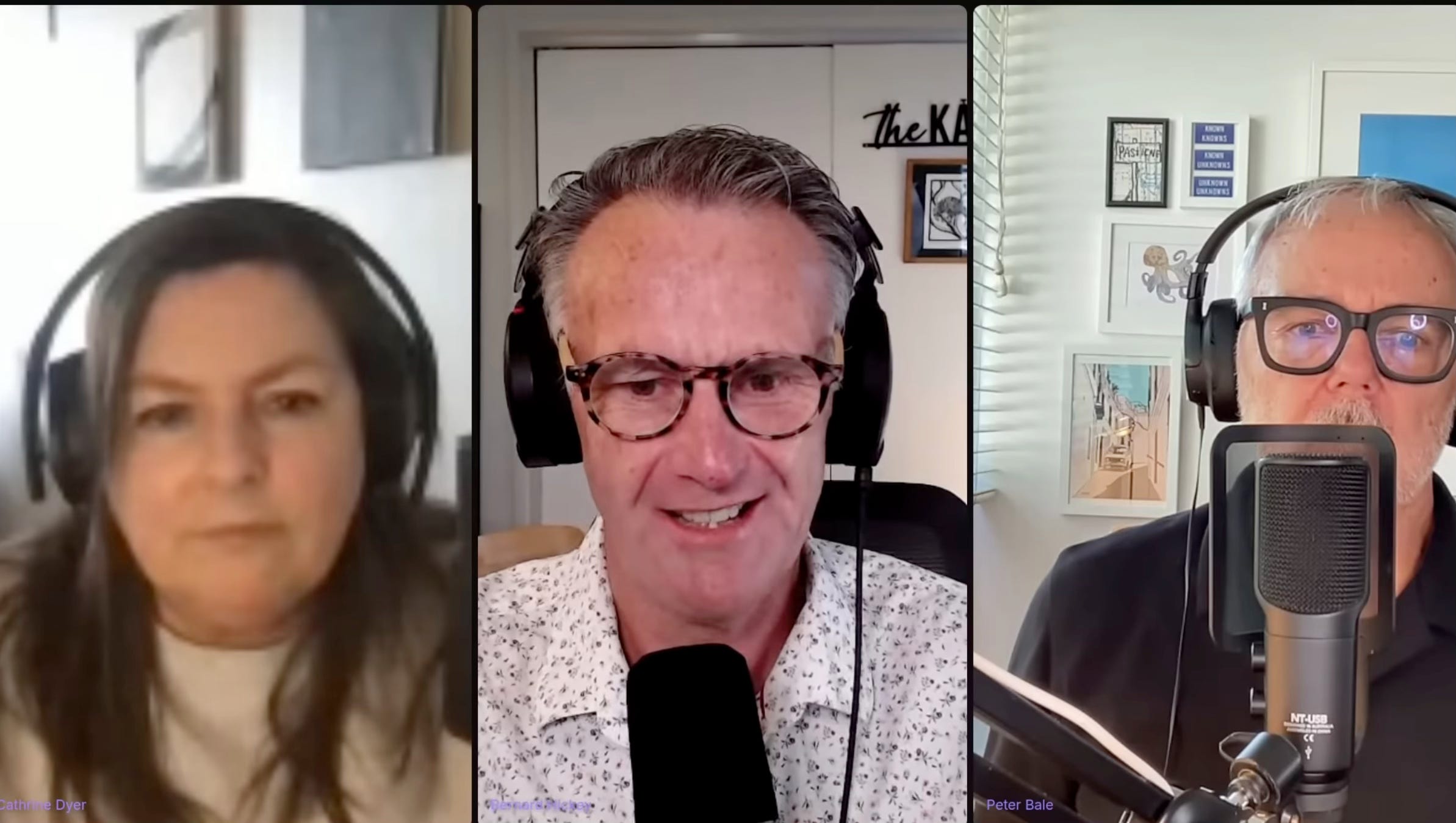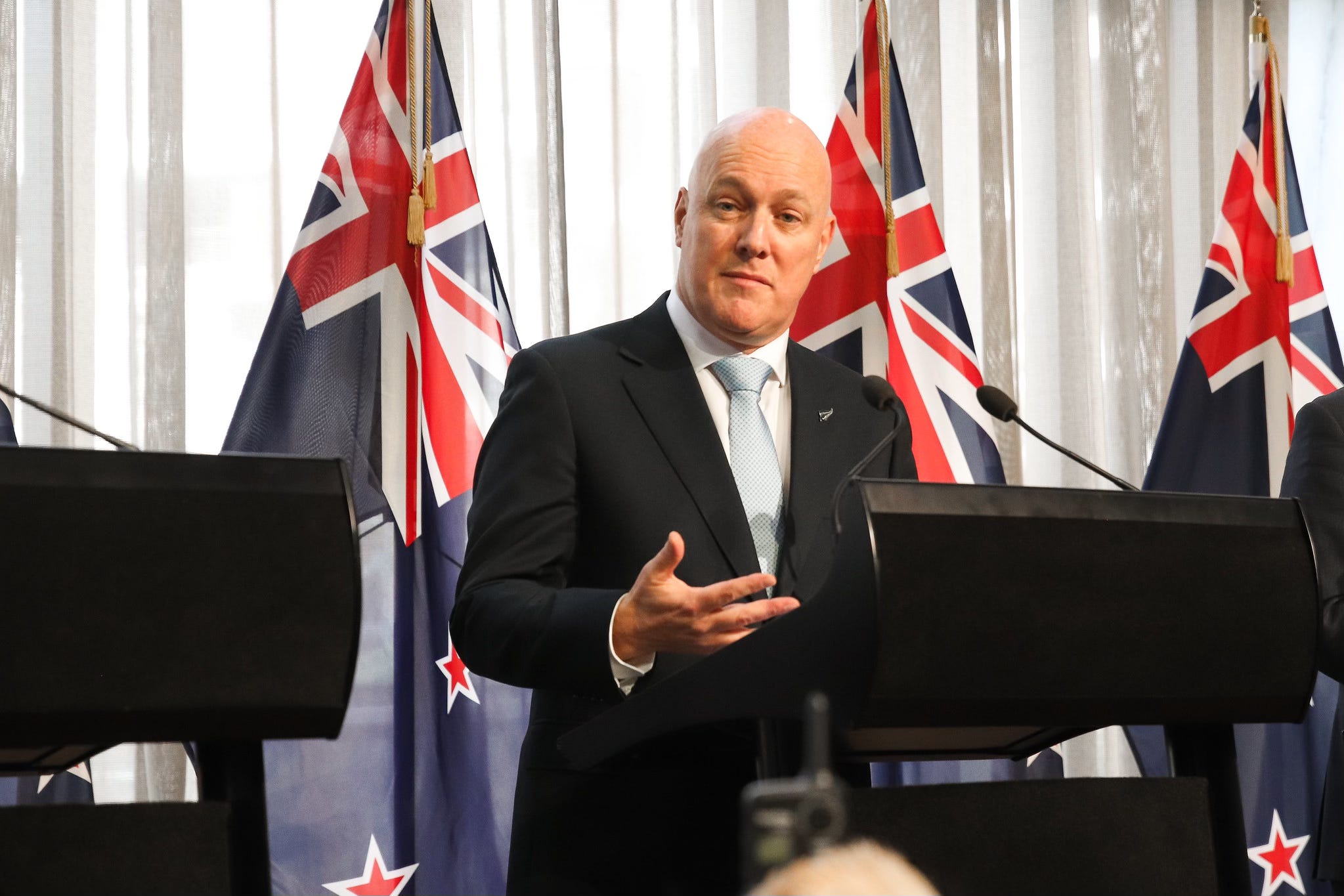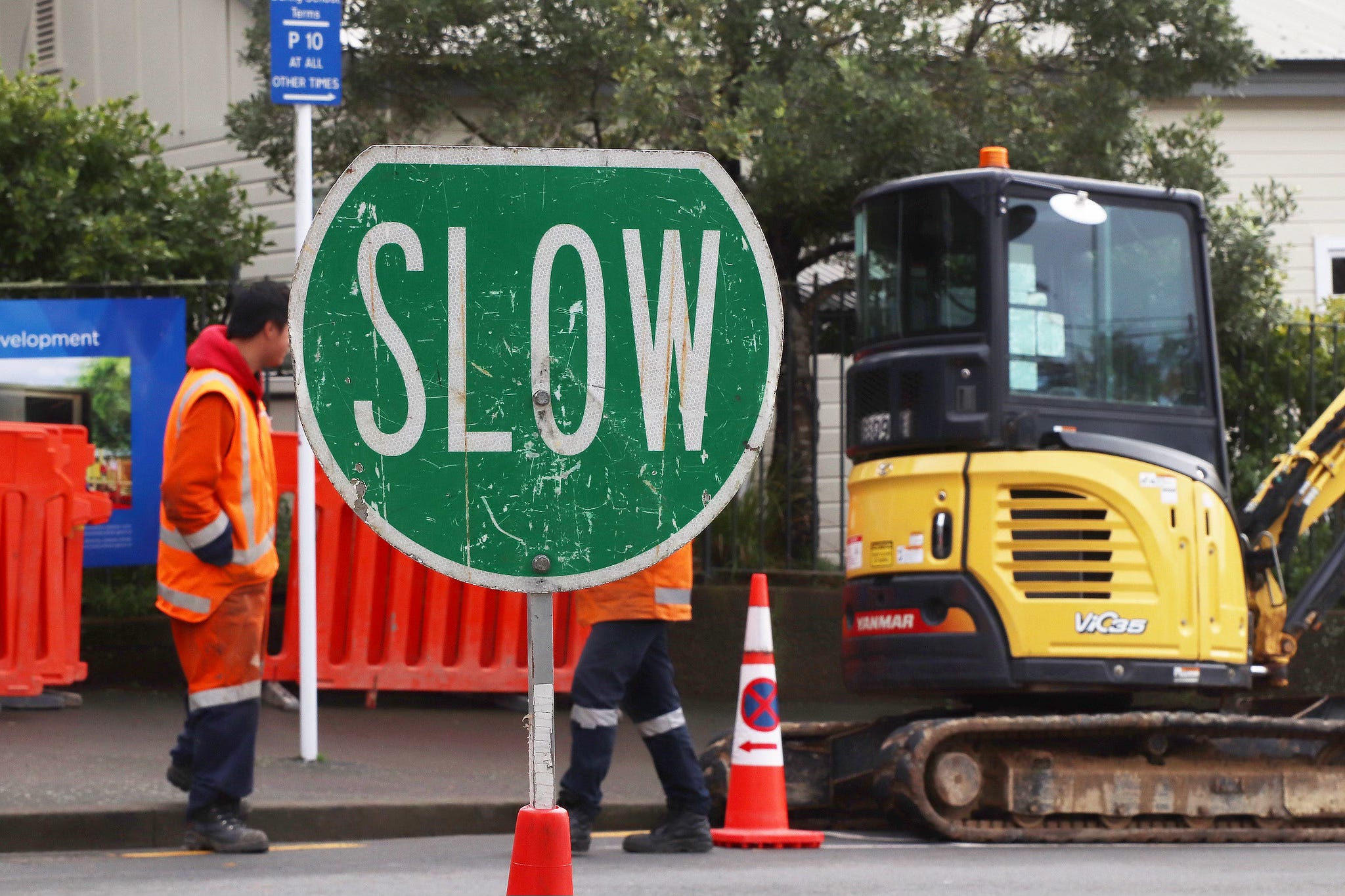

The Kākā by Bernard Hickey (private feed for simon.wheatley@acgedu.com)
https://api.substack.com/feed/podcast/102473/private/76eceb36-122f-486d-a5ae-521891ab2480.rssEpisode List

The Weekly Hoon: Mr Bone Saw, Ford Rangers & ATACMS
The podcast above of the weekly ‘Hoon’ webinar for paying subscribers on Thursday night featured co-hosts Bernard Hickey and Peter Bale talking with regular guests Cathrine Dyer and Robert Patman and a special guest about the economy, politics, geopolitics and climate change.This week’s special guest was Drive Electric Chair Kirsten Corson.This week:* Bernard and Peter talked about Peter’s work on a CEO profile special series of articles for BusinessDesk-$, including that Brian Roche’s favourite book was by Jo Nesbo.* Bernard, Peter and Cathrine talked about the Government’s decision this week to slash penalties for importing high emissions vehicles to save buyers of double-cab utes hundreds of dollars.* Peter and Robert talked about Donald Trump’s attacks on the rules of international law, referring to this article by Philippe Sands in The Guardian. They also talked about the latest secret peace deal for Ukraine agreed between the United States and Russia, but which didn’t include Ukraine or Europe.* Bernard and Kirsten talked about the state of climate policy in the wake of the shredding of the clean car discount scheme.The Hoon’s podcast version above was recorded on Thursday night during a live webinar for over 200 paying subscribers and was produced and edited by Simon Josey. The Hoon won the silver award for best current affairs podcast in last year’s New Zealand Podcast awards. (This is a sampler for all free subscribers and anyone else who stumbles on it. Thanks to the support of paying subscribers here, we’re able to spread my public interest journalism here about housing affordability, climate change and poverty reduction other public venues. Join the community supporting and contributing to this work with your ideas, feedback and comments, and by subscribing in full. Remember, all students and teachers who sign up for the free version with their .ac.nz and .school.nz email accounts are automatically upgraded to the paid version for free. Also, here’s a couple of special offers: $3/month or $30/year for under 30s & $6.50/month or $65/year for over 65s who rent.)Ngā mihi nui.Bernard This is a public episode. If you'd like to discuss this with other subscribers or get access to bonus episodes, visit thekaka.substack.com/subscribe

Wednesday's Chorus: Churn claims Police target
Briefly in the news in Aotearoa’s political economy around housing, poverty and climate on Wednesday, November 19:* An extra 1,967 people have been put in prison since late 2023, increasing the total population by September 30 to a record-high 10,860, which PM Christopher Luxon said yesterday was “a good thing” and he wasn’t worried about the cost, saying: “We make no apologies about that. The cost will be what the cost will be.” (RNZ)* Luxon also acknowledged yesterday the Government would fail to achieve its already-extended target of recruiting an extra 500 Police officers to reach a total of 10,711 by November 27 (next Thursday), describing it as a “stretch target” and adding: “It’s taking longer than we had hoped for. It’ll be what it will be.” (RNZ)* Luxon said a year ago of the target: “We’re going to do it. Judge me by the results when we get there.”* One reason for the failure to hit the target is that 212 officers had resigned and moved to Australia to become officers there, including between 50-60 who went to Northern Territory, where Police pay a housing allowance of $32,000 a year, on top of a starting salary of A$140,000. (1News)* Meanwhile, the day after it emerged Housing Minister Chris Bishop had moved funds from Kāinga Ora’s cancelled house-building programme to build a bridge in his Lower Hutt electorate, NZ Herald-$ reported this morning that 402 of the 642 applications for emergency housing in Auckland in August were declined.* The Government is now spending $1.9 billion a year housing nearly 11,000 prisoners (an average of $173,000 per prisoner per year) and has signed off on plans to spend billions more to build another 2,190 prison beds in the next four years. * Also since its formation in late November 2023, the Coalition Government has cancelled plans to build another 3,500 Kāinga Ora homes and has removed 2,500 people from emergency housing in motels, some of whom it does not know where they ended up. Charities helping the homeless say many have ended up sleeping in doorways, tents and under motorway bridges, including over 600 in Auckland.* Many of the rough sleepers have gone to Hospital A&E departments over winter with ailments picked up living in the open, forcing the Government to spend hundreds of millions more on pre-fabricated A&E beds, and some have ended up in prison at a cost of almost $500 per night.* But businesses want even more people churning through the country. BusinessNZ called this morning for an extra 250,000 workers by 2045, suggesting average net migration be increased to 125,000 per year to reach a total population of 10 million by 2060, almost double the current population of 5.3 million, which it said “would require a policy and infrastructure shift.”Join us as a paying subscriber to get more analysis and detail in the podcast above and below the paywall fold, and be able to comment below and join The Kākā community in webinars and our chat room. Paying subscribers also enable me to do this journalism. If paying subscribers ask in the comments below and ‘like’ the article more than 100 times, I will open it up for full public reading, listening and sharing later today.Churning & burning to imprison more & house lessThe numbers are remorseless and confronting, let alone the political commentary around them.The Government has increased the prison population by 1,967 to a record-high 10,860 since its formation in late November. It is now spending over $1.9 billion a year housing them and plans to add another 2,189 beds over the next four years.PM Christopher Luxon was asked about the record-high number of prisoners and the failure to recruit the 500 extra Police officers yesterday.“Absolutely, that’s a good thing. Yep, good thing.“I understand the financial implication of restoring law and order in New Zealand, but we make no apologies about that. The cost will be what the cost will be.” PM Christopher LuxonTo investigate, arrest and accuse them of crimes, the Police are spending $3 billion a year and the Government has a target to increase the number of officers by 500 to 10,071 by next Thursday. Treasury said the target was now unlikely to be achieved until September of next year.Housing shortage a big reason for exodus of officers to AustraliaOne reason it will fail to meet the target is churn of almost 40% of that recruitment number to Australia. 1News reported last night 212 officers had resigned and emigrated to to Australia to become officers there, including 50-60 who went to Northern Territory. Police confirmed there had been 670 vetting requests from Australian Police for New Zealand officers in the last two years.“We’ve been ramping up our recruitment, probably post Covid significantly. So we have been going to other other states, and New Zealand a number of cases. I think this is probably the fourth time in the last two or so years.” Northern Territory Police Acting Superintendent Serge BoumaBouma said housing was a major draw for New Zealand officers.“One of the big, big ticket items that we offer to every single sworn police officer is housing, housing support.” (If officers do not take a department-leased home) “we will supplement your income at I think currently, it’s just shy of $32,000 a year over and above your normal income as a tax allowance.” “A new constable would be on about $140,000 Australian (before allowances, penalties and overtime) BoumaPolice Commissioner Richard Chambers said he hoped some would come home, noting there had been enquiries from 16 of the 212 about coming home. The Daily Chart Pack: Churning, burning & sleeping roughIn politics, NZ’s prison population hits a record high……while the number of rejected bids for housing support rises.My Pick n’ Mix of links elsewhere* Investigation by Kirsty Johnson for RNZ: How the fuel of ‘last resort’ became New Zealand’s first choice* Investigation by Farah Hancock for RNZ: Luxon’s broken promise on feral cats* Deep-dive Daniela Maoate-Cox for The House via RNZ: How a ‘loophole’ resulted in 11-day submission period on fast-track amendments law* Sue Teodoro for Stuff: ‘If towns can’t grow, the region can’t grow’ ‘Builder laments development woes“The number one issue for me is the uncertainty,” Greytown-based master builder and construction company owner Paul Southey says in relation to current development restrictions.’* Libby Kirkby-McLeod for RNZ: Refuge organisations shocked at increase in women needing to escape abuse* Anne Gibson for NZ Herald-$: Retiree kept waiting for $515k, Metlifecare cites housing market for unsold apartmentCartoons: The winner grins and the apple rotsTimeline-cleansing nature pic: ‘Well, hello…’Ka kite anoBernard This is a public episode. If you'd like to discuss this with other subscribers or get access to bonus episodes, visit thekaka.substack.com/subscribe

The Weekly Hoon: A climate cop out; the BBC's crisis; Kids Kiwisaver & how to Jujitsu Nicola Willis on Govt debt
The podcast above of the weekly ‘Hoon’ webinar for paying subscribers on Thursday night featured co-hosts Bernard Hickey and Peter Bale talking with regular guest Cathrine Dyer, and a special guest about the economy, politics, geopolitics and climate change.This week’s special guest was The IDEA Charitable Trust’s Max Rashbrooke Our topics this week were:* Bernard and Peter talked about the BBC’s crisis.* Bernard, Peter & Cathrine talked about the COP30 conference and Cathrine’s article on it for The Conversation. * Bernard, Peter and Max talked about IDEA’s proposal for a Kids Kiwisaver.* Bernard, Peter and Max talked about Max’s column for The Spinoff this week on how the left’s arguments against the Government’s debt aversion aren’t working, and what ‘jujitsu’ tactic might work better.The Hoon’s podcast version above was recorded on Thursday night during a live webinar for over 200 paying subscribers and was produced and edited by Simon Josey. The Hoon won the silver award for best current affairs podcast in this year’s New Zealand Podcast awards. (This is a sampler for all free subscribers and anyone else who stumbles on it. Thanks to the support of paying subscribers here, we’re able to spread my public interest journalism here about housing affordability, climate change and poverty reduction other public venues. Join the community supporting and contributing to this work with your ideas, feedback and comments, and by subscribing in full. Remember, all students and teachers who sign up for the free version with their .ac.nz and .school.nz email accounts are automatically upgraded to the paid version for free. Also, here’s a couple of special offers: $3/month or $30/year for under 30s & $6.50/month or $65/year for over 65s who rent.)Ngā mihi nui.Bernard This is a public episode. If you'd like to discuss this with other subscribers or get access to bonus episodes, visit thekaka.substack.com/subscribe

Wednesday's Chorus: A lazy balance sheet
Briefly in the news in Aotearoa’s political economy around housing, poverty and climate on Wednesday, November 12:* A fresh debate has blown up around whether the Government should sell state assets to fund investment in hospitals, roads and schools. Proponents describe this as ‘asset recycling’ and frame it as simply making the most efficient use of the Government’s balance sheet.* PM Christopher Luxon even went as far as to say on Monday evening that the Government had a “lazy balance sheet,” which is a corporate term to describe a company that isn’t using its balance sheet, both its assets and debt, as aggressively as it should to maximise shareholder equity. Interest* Luxon was referring to the asset side of the balance sheet, as the Treasury was last Friday in its once-every-four-years Investment Statement. But both he and the Treasury are ignoring the other side of the balance sheet, debt, which is something corporate investors don’t do.* In my view, Luxon and the Treasury are right to view the Government’s balance sheet as lazy, but for debt, not assets. New Zealand’s Government has a positive net worth after including assets and the NZ Super Fund of 43.6% of GDP, largely because the Government hasn’t used debt to invest to keep up with population growth and maintain existing infrastructure.* The Government and Aotearoa would get a much better ‘return on equity’ by using leverage to build up its assets and the wellbeing of its people.Join us as a paying subscriber to get more analysis and detail in the podcast above and below the paywall fold, and be able to comment below and join The Kākā community in webinars and our chat room. Paying subscribers also enable me to do this journalism.Yes, PM, NZ does have a lazy balance sheet The debate about asset sales has broken out again after Treasury suggested ‘asset recycling’ in its once-every-four-years investment statement last Friday. PM Christopher Luxon was asked on Monday and again yesterday if a second-term National Government would ‘recycle assets’ to ‘optimise the Government’s asset mix.’ He agreed, but wasn’t specific about what could be sold or how the money could be reinvested.Luxon said he wanted to optimise the Crown’s balance sheet and overall fiscal performance, as Interest’s Dan Brunskill reported late on Monday. He said that didn’t necessarily mean selling assets to reduce debt, it could also mean encouraging commercial entities to deliver stronger returns.“As a former business guy, you just don’t want lazy balance sheets.“You want to optimize your profit and loss statement, that’s strongly connected to your balance sheet, and you want to be … actually maximising your balance sheet really effectively.” Luxon quoted by Dan Brunskill via Interest.In my view, New Zealand’s Government has a balance sheet that it should use to invest in infrastructure and people to improve productivity and wellbeing. That’s because over the last 20 to 30 years, we haven’t done that in a way that keeps up with population growth. However, the political debate is very much focused on the idea that we can’t borrow to do that and that if the government needs to invest in things, it needs to sell things first. This is the idea described as asset recycling. It’s a framing and a phrase that’s used by those who are keen on asset sales and want to present it as a simple swap, ie ‘we sell this asset that we no longer need and then we invest it in hospitals or roads or schools.’But this framing does ignores the other side of the balance sheet: debt.The Prime Minister, a former CEO of Air New Zealand, likes to present or frame his job and the government as similar to a business, often using business language to describe it. However, one of the ways that businesses and investors often talk about balance sheets of companies when there is an opportunity to improve its performance is to talk about the company having a ‘lazy balance sheet.’ When businesses talk about lazy balance sheets, they often talk about a business which doesn’t have enough debt, which has not geared up its balance sheet to increase return on equity. If you have borrowed money to invest in an asset and your equity rises in value, then you get a much faster rise in equity if you have used it to buy or create that asset. So fund managers in businesses that have very solid cash flows will often suggest management borrow to either buy assets or return capital to shareholders. The risks are that a company borrows too much and goes bankrupt if its cash flow dries up. That’s less of an issue for a government, as it has the power to tax. Also, the size of the Crown’s balance sheet is so large, that it can absorb shocks. NZ’s balance sheet is very lazy, but on the debt side, not on the asset sideNew Zealand’s net debt is in fact not only low, it’s non-existent. That’s because New Zealand has a lot of assets on the other side of the balance sheet, in particular New Zealand Superfund, but also enormous amounts of land and other buildings and various businesses that mean New Zealand is actually in a net equity position with net worth of 43.6% of GDP. But that’s not how it’s usually described.You will have heard the government and the Treasury talk about New Zealand’s net core Crown debt being in a dangerously high position and that we need to stop spending and try to repay debt. But that’s actually not true, as the chart below shows.The New Zealand Government’s debt is actually incredibly low, relative to other countries and relative to the Government’s assets. Also, net interest costs are around 1% of Government’s income. If you were a homeowner and you went to your bank and said you were worried about high debt because your interest costs were 1% of your disposable income, the bank would say not to worry too much and that you should borrow to ensure you have a warm, dry home and that your kids are growing up safely. And that’s the case where we are with the government’s balance sheet.So in my view, the government is right to think about the government having a lazy balance sheet, but not in an asset sense, in a debt sense. Chart of the day: New Zealand’s lazy balance sheet My short Pick n’ Mix of links elsewherePolitics and the Economy* Thomas Coughlan & Jamie Ensor for NZ Herald: Ex-Police Commissioner Coster on leave from new job after damning report* Giles Dexter for RNZ: Congestion charging legislation passes third reading* Craig McCulloch for RNZ: ‘He’s been here 50 years’: Luxon brushes off Peters’ asset sales attack* Ric Stevens for Open Justice via RNZ: Hawke’s Bay director jailed 14 years for exploiting, raping workers* Russell Palmer for RNZ: Labour ‘absolutely’ comfortable if Te Pāti Māori does not return to Parliament* RNZ Morning Report: ‘Tawdry, silly argument’: Peters lays into asset salesHousing, Climate & Poverty* Laura Walters for Newsroom Pro-$: Survivors say Crown apology proves ‘hollow’ 12 months on ‘A year on from the PM’s apology to those abused in state care, survivors say they are still waiting for proper redress, accountability and closure.’* Greg Ninness for Interest: Housing values flat overall but notable declines in Auckland, Whangarei and Tauranga, QV says ‘QV says Auckland housing values have posted some significant declines with the biggest falls in the city’s central and southern districts’* David Hargreaves for Interest: Some soothing news for the RBNZ ahead of OCR decision - inflation expectations muted ‘RBNZ survey shows expectations of the future level of inflation have barely changed and remain ‘anchored’ near 2% despite the rise in actual annual inflation to 3%’* Greg Ninness for Interest: Rental figures are good news for tenants but landlords won’t be happy ‘Latest rental data suggests strong supply of rental housing is pushing down rents’* Column by Joel MacManus for The Spinoff: The government’s homelessness ‘ban’ may not be as ridiculous as it sounds. ‘The only cure for homelessness is homes, but responsible policing plays an important role in manage the symptoms.’* Pokere Paewai for RNZ: Human rights complaint filed over treatment of MāoriCartoon: The past and the futureTimeline-cleansing nature pic: Cirque de TuiKa kite anoBernard This is a public episode. If you'd like to discuss this with other subscribers or get access to bonus episodes, visit thekaka.substack.com/subscribe

Friday's Chorus: A miserly, investment-lite Government
Briefly in the news in Aotearoa’s political economy around housing, poverty and climate on Friday, November 7:* Despite pledges the Government is ramping up capital spending to reduce infrastructure deficits and spark economic growth, Treasury yesterday published accounts for the first three months of the financial year showing the Government’s capital investment spending rose 1.6% to $918 million in the first quarter from a year ago, growth which is less than half the CPI inflation rate. * The capital investments in the September quarter were at least $267 million less than forecast in the May Budget and were less than half the depreciation recorded in the accounts for the quarter of $2.101 billion.* The accounts also showed Government spending on wages fell 1.6% to $9.95 billion in the quarter from a year ago. Public sector wages grew 2.4% in the quarter from a year ago and household living costs grew 2.4%, which amplified the effect on wider consumer spending of public sector job cuts. * The cost of building and servicing the PPP debt on Wellington’s Transmission Gully motorway has blown out to $3.75 billion over the next 25 years, including $1.25 billion to build it and $2.5 billion to service the debt over 25 years, and that’s before an extra $32 million per year from this year to maintain the road. It would mean the motorway cost $139 million per km to build and a non-inflation-adjusted $132 million per year $5 million per km per year or to run. The Post-$* Troy Bowker, a Wellington businessman who has accused most New Zealand media outlets of left-wing bias and helped lead a nearly-successful takeover of NZME by activists wanting less left wing content in the NZ Herald, has bought the building in Petone containing Stuff’s printing plant for The Post and many other newspapers in the bottom half of the North Island. * The lease is up for renewal next year with a potential one-year extension to 2027, raising the possibility Bowker either buys and publishes The Post, which is again reportedly up for sale, or shuts it down by refusing to extend the lease, given the high costs of removing and re-housing the printing plant. NZ Herald-$* Today’s top must read, in my view is Amy Williams’ deep-dive on homelessness in Auckland for RNZ this morning. Homeless becoming more desperate, court worker saysJoin us as a paying subscriber to get more analysis and detail in the podcast above, and be able to comment below and join The Kākā community in webinars and our chat room. Paying subscribers also allow me to do this journalism. I am opening this one immediately to all, mainly so the young & homeless who can’t afford it can read it. Thanks to subscribers in advance.A miserly & investment-lite GovernmentThe Government continues to argue it is investing heavily in infrastructure to grow the economy and is not using short-term financial management, but the Crown Accounts for the first three months of the current financial year show a different story.The bottom line most focused on from yesterday’s figures was the budget deficit being $496 million worse than expected at $3.955 billion, thanks to weaker tax revenues from a stuttering economy, shell-shocked consumer spending and job losses. But the cash bottom line deficit of $1.362 billion was $1.639 billion better-than expected. That meant the Government’s net core Crown Debt of $184.673 billion was up $2.5 billion, but was around $5.2 billion less than expected, after revaluations.That appears not to compute, until you look more closely at the capital spending line, which was $918 million for the quarter, which was $287 million less than forecast. Total capital committments for future years were $15.53 billion, down from $16.865 billion a year earlier. A wider number for capital committments for the year also fell, as Treasury pointed out:“The lower than forecast net core Crown capital outflows was owing to lower than forecast net purchase of investments ($1.6 billion). This largely reflects capital funding from the core Crown into Crown entities and SOEs which are mainly used for the purchase of property, plant and equipment.” Treasury commentary on page 3 of the Crown Accounts for the September quarter.A simpler measure, as detailed below, showed capital spending of $918 million, less than half the depreciation noted in the accounts.The Government has argued it can’t afford to keep growing spending or ramp up capital spending dramatically because Government debt and interest costs were too high.However, the accounts show net interest costs of just $628 million after the receipts from interest and dividends, which is barely 1.5% of total revenues. Would you worry about your debt to the extent to restrict spending on life-saving equipment and staffing because your mortgage costs had risen to 1.5% of your disposable income? Chart of the Day: A generational issueMy short Pick n’ Mix of links elsewhereA few subscribers asked for me to continue the Picks n’ Mixes, even in limited form. Politics and the Economy* Deep-dive by Amy Williams for RNZ: Homeless becoming more desperate, court worker says* RNZ: Govt pays $6.3m for Michelin restaurant reviewers to tour NZ* Deep-dive by David Williams for Newsroom: Who Benefits: The rise and rise of the Free Speech Union ‘A free speech advocacy group looks ahead but struggles to shake off the label of a dark money think tank’* Laura Walters for Newsroom: Officials warn school board changes breach Treaty ‘In a political flip-flop, Education Minister Erica Stanford has decided to remove the Treaty of Waitangi obligations on school boards without consulting Māori’* Susan Edmunds for RNZ: $50 an hour, 12% superannuation: Australian recruiters target jobseekers* Gareth Vaughan for Interest: BNZ says lower interest rates enabling customers to pay down loans fasterHousing, Climate & Poverty* Tova O’Brien for Stuff: Wellington depression recovery centre to close after no funding reprieve. ‘Accidental meeting invite from Health NZ gave false hope but no reprieve for Wellington mental health service’* Deep-dive by Maddy Croad for The Press-$: ‘Abandoned and betrayed’: Disabled community still hurting a year after funding cuts. ‘Ruth Jones says many Kiwis are still struggling to recover mentally, financially and physically - unable to get funding for basics like carers or incontinence pads.’* Investigation by Jonathan Milne for Newsroom: Govt answers fishing chief’s billion dollar question on climate disclosures ‘There are a handful of corporates that stand to benefit from Commerce Minister Scott Simpson’s unexpected call to dramatically loosen climate reporting requirements; some are political donors’* Column by Marc Daalder for Newsroom Pro-$: Govt’s climate strategy: Let it burn ‘Since the election, the Government has pursued policies that boost climate pollution – even if they cost more or jeopardise NZ’s reputation. We lay out the long list of retreats on climate action.’* Column by Barbara Fountain for Newsroom: Stop telling health professionals to get back in their box ‘By trying to silence health professionals, the Govt risks smothering advocacy, equity and reform’* Deep-dive by Nikki Mandow for Newsroom: When everyone lived in an affordable homeCartoons: Cliff diving economicsTimeline-cleansing nature picKa kite anoBernard This is a public episode. If you'd like to discuss this with other subscribers or get access to bonus episodes, visit thekaka.substack.com/subscribe
You may also like
Create Your Podcast In Minutes
- Full-featured podcast site
- Unlimited storage and bandwidth
- Comprehensive podcast stats
- Distribute to Apple Podcasts, Spotify, and more
- Make money with your podcast



